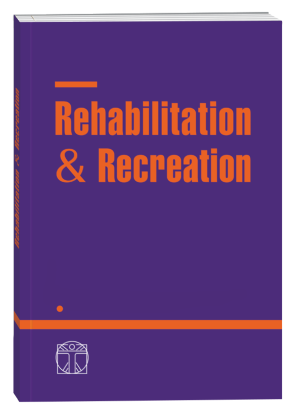THE RELATIONSHIP BETWEEN HUMAN SPIRITUALITY AND THE FUNCTIONAL STATE OF THE CARDIO-RESPIRATORY SYSTEM
DOI:
https://doi.org/10.32782/2522-1795.2024.18.2.10Keywords:
spirituality, personal maturity, Jose Stevens, cardio-respiratory system, relationAbstract
Aim is to determine the level of spirituality of a person in terms of personal maturity and to investigate its connection with the functional state of the cardio-respiratory system. Material and methods. A total of 560 research participants were examined, 301 (53.75%) of whom were men, and 259 (46.25%) of whom were women. The average age of the examined people was (M±S) 35.00±17.75 (95% confidence interval is 33.52 to 36.47 years of age). There were 337 (60.18%) of patients who were treated in the rehabilitation departments of medical institutions, and 223 (39.82%) of healthy persons (students of the Humanities University). Spirituality was assessed by determining the level of maturity of consciousness and self-awareness of the individual according to Jose Stevens (1994, 2019). The following levels of spirituality were applied in terms of personal maturity: undifferentiated, low (“infant” + “toddler”), medium-low (“child”), medium-high (“adolescent /young man”), high (“adult”) and various combined levels. Anthropometric measurements included body mass and height. The function of the circulatory and respiratory organs of the research participants was assessed according to the following parameters: resting heart rate (RHR), resting respiratory rate, systolic and diastolic blood pressure (BP), forced vital capacity (FVC). Results. The following patterns were established between a person’s spirituality and the functional state of the cardio-respiratory system: research participants with the highest heart rate have the most cases of a low level of spirituality, and research participants with the lowest heart rate (at the limit of statistical significance) have the least cases of this level of spirituality; research participants with high systolic blood pressure have the most cases of undifferentiated and low levels of spirituality, and research participants with low systolic blood pressure have the most cases of medium-high level of spirituality; research participants with high diastolic blood pressure have the most cases of low level of spirituality, and research participants with low blood pressure have the most cases of medium-high level of spirituality; research participants with the lowest FVC have the most cases of a low level of spirituality; research participants with the shortest length of inspiratory breath-holding time have the most cases of undifferentiated and low levels of spirituality. Conclusions. The functional capabilities of the cardio-respiratory system are significantly related to the level of a person’s spirituality: persons with a good/normal functional state have mostly high levels of spirituality, and persons with a poor functional state have low and undifferentiated levels of spirituality; sick people, compared to healthy people, are mostly characterized by low levels of spirituality.
References
Діагностичні підходи до визначення стану духовного і морального здоров’я особистості : навчальний посібник для проведення практичних занять / уклад.: М.С. Гончаренко, Е.Т. Карачинська, В.Є. Новікова. Харків : Харківський національний університет ім. В.Н. Каразіна, 2009. 156 с.
Питання організації реабілітації у сфері охорони здоров’я : Постанова Кабінету Міністрів України від 3 листопада 2021. № 1268. URL: https://zakon.rada.gov.ua/laws/show/1268-2021-%D0%BF#Text.
Про реабілітацію у сфері охорони здоров’я : Закон України від 15.12.2021. № 1962-ІХ. URL: https://zakon.rada.gov.ua/laws/show/1053-20#Text.
Савченко В., Буряк О., Харченко Г., Полковенко О., Омері I., Яценко C. Стан духовного здоров’я хворих людей та його зв’язок з медичними висновками про соматичне здоров’я на курорті. Спортивна наука та здоров’я людини. 2019. № 1. С. 109–120.
Савченко В.М., Неведомська Є.О., Омері І.Д., Харченко Г.Д., Тимчик О.В., Іващенко С.М., Буряк О.Ю., Яценко С.П. Духовність за рисами характеру хворих і здорових людей та її зв’язок з показниками фізичного, психічного і соціального здоров’я, способу життя та особистісними факторами. Physical education and sports as a factor of physical and spiritual improvement of the nation : Scientific monograph. Riga, Latvia : «Baltija Publishing», 2022. С. 340–428. URL: http://www.baltijapublishing.lv/omp/index.php/bp/ catalog/ book/216.
Савченко В., Харченко Г., Буряк О., Омері І., Неведомська Є., Тимчик О., Яценко С., Погребняк Ю. Особистісна зрілість людини та її зв’язок з інтегральними висновками про функціональний стан кардіореспіраторної системи. Спортивна наука та здоров’я людини. 2022. № 1(7). С. 80–97. DОІ: 10.28925/2664-2069.2022.17.
Стівенс Хосе. Приборкай своїх драконів. Як перетворити недоліки на переваги. / Переклад з англ. Харків : Клуб сімейного дозвілля, 2019. 462 с. URL: https://bookclub.ua/catalog/books/motivation/priborkay-svoyih-drakonivyak-peretvoriti-nedoliki-na-perevagi.
Anyfantakis D., Symvoulakis E.K., Panagiotakos D.B., Tsetis D., Castanas E., Shea S., Venihaki M., Lionis C. Impact of religiosity/spirituality on biological and preclinical markers related to cardiovascular disease. Results from the SPILI III study. Hormones (Athens). 2013. Vol. 12(3). Р. 386–396. DOI: https://doi.org/10.1007/BF03401304.
Brintz C.E., Birnbaum-Weitzman O., Llabre M.M., Castañeda S.F., Daviglus M.L., Gallo L.C., Giachello A.L., Kim R.S., Lopez L., Teng Y., Penedo F.J. Spiritual well-being, religious activity, and the metabolic syndrome: results from the Hispanic Community Health Study/Study of Latinos Sociocultural Ancillary Study. J Behav Med. 2017. Vol. 40(6). Р. 902–912. DOI: https://doi.org/ 10.1007/s10865-017-9858-7.
Buttle H. Measuring a Journey without Goal: Meditation, Spirituality, and Physiology. Biomed Res Int. 2015: 891671. DOI: https://doi.org/ 10.1155/2015/891671.
Constitution of the World Health Organization. New York. 2006. URL: https://www.who.int/publications/m/item/constitutionof-the-world-health-organization.
Edmondson K.A., Lawler K.A., Jobe R.L., Younger J.W., Piferi R.L., Jones W.H. Spirituality Predicts Health and Cardiovascular Responses to Stress in Young Adult Women. J Relig Health. 2005. Vol. 44. Р. 161–171. DOI: https://doi.org/10.1007/s10943-005-2774-0.
Hasegawa T., Kawai M., Kuzuya N., Futamura Y., Horiba A., Ishiguro T., Yoshida T., Sawa T., Sugiyama Y. Spiritual well-being and correlated factors in subjects with advanced copd or lung cancer. Respir Care. 2017. Vol. 62(5). Р. 544–549. DOI: https://doi.org/ 10.4187/respcare.05282.
Heidari J., Jafari H., Janbabaei G. Life quality related to spiritual health and factors affecting it in patients afflicted by digestive system metastatic cancer. Mater Sociomed. 2015. Vol. 27(5). Р. 310–313. DOI: https://doi.org/ 10.5455/msm.2015.27.310-313.
Helvaci A., Izgu N., Ozdemir L. Relationship between symptom burden, medication adherence and spiritual well-being in patients with chronic obstructive pulmonary disease. J Clin Nurs. 2020. Vol. 29(13–14). Р. 2388–2396. DOI: https://doi.org/: 10.1111/jocn.15251.
Heredia-Rizo A.M., Martinez-Calderon J., Piña-Pozo F., González-García P., García-Muñoz C. Effectiveness of mind-body exercises in chronic respiratory diseases: an overview of systematic reviews with metaanalyses. Disabil Rehabil. 2023. Р. 1–16. DOI: https://doi.org/ 10.1080/09638288.2023.2233899. Online ahead of print.
Holt-Lunstad J., Steffen P.R., Sandberg J., Jenson B. Understanding the connection between spiritual well-being and physical health: an examination of ambulatory blood pressure, inflammation, blood lipids and fasting glucose. Journal of Behavioral Medicine. 2011. Vol. 34(6). Р. 477–88. DOI: https://doi.org/10.1007/s10865-011-9343-7.
International classification of functioning, restriction of life activities and health: MKF. World Health Organization, Geneva, 2021. URL: https://www.who.int/standards/classifications/international-classification-of-functioningdisability-and-health.
Krause N., Ironson G., Pargament K.I. Spiritual struggles and resting pulse rates: Does strong distress tolerance promote more effective coping? Personality and Individual Differences. 2016. Vol. 98. Р. 261–265. DOI: https://doi.org/10.1016/j.paid.2016.04.064.
Litalien M., Atari D.O., Obasi, I. The Influence of Religiosity and Spirituality on Health in Canada: A Systematic Literature Review. J Relig Health. 2022. Vol. 61(1). Р. 373–414. DOI: https://doi.org/10.1007/s10943-020-01148-8. Online ahead of print.
Lucchese F.A., Koenig H.G. Religion, spirituality and cardiovascular disease: research, clinical implications, and opportunities in Brazil. Revista brasileira de cirurgia cardiovascular: orgao oficial da Sociedade. Brasileira de Cirurgia Cardiovascular. 2013.
Vol. 28(1). Р. 103–128. DOI: https://doi.org/10.5935/1678-9741.20130015.
Mukaetova-Ladinska E.B., Purshouse K., Andrade J., Krishnan M., Jagger C., Kalaria R.N. Can healthy lifestyle modify risk factors for dementia? Findings from a pilot communitybased survey in Chennai (India) and Newcastle (UK). Neuroepidemiology. 2012. Vol. 39(3-4). Р. 163–170. DOI: https://doi.org/10.1159/000338674.
Olex S., Newberg A., Figueredo V.M. Meditation: should a cardiologist care? Int J Cardiol. 2013. Vol. 168(3). Р. 1805–1810. DOI: https://doi.org/ 10.1016/j.ijcard.2013.06.086.
Oman D., Brown T.T. Health policy and management, religion, and spirituality. Why religion and spirituality matter for public health: Evidence, implications, and resources / D. Oman (Ed.). Springer International Publishing, 2018. Р. 191–210. DOI: https://doi.org/10.1007/978-3-319-73966-3_11.
Oman D. Religious/spiritual effects on physical morbidity and mortality. Why religion and spirituality matter for public health: Evidence, implications, and resources / D. Oman (Ed.). Springer International Publishing, 2018. Р. 65–79. DOI: https://doi.org/10.1007/978-3-319-73966-3_4.
Pargament K.I., Saunders S.M. Introduction to the special issue on spirituality and psychotherapy. Journal of Clinical Psychology. 2007. Vol. 63(10). Р. 903–907. DOI: https://doi.org/10.1002/jclp.20405.
Rosmarin D.H., Wachholtz A., Ai A. Beyond descriptive research: advancing the study of spirituality and health. J Behav Med. 2011. Vol. 34(6). Р. 409–413. DOI: https://doi.org/10.1007/s10865-011-9370-4.
Savchenko V., Kharchenko H., Buriak O., Omeri I., Nevedomsjka J., Tymchyk O., Yatsenko S. Personal maturity of sick and healthy people and its relationship to gender, age and anthropometric indicators. Journal of Physical Education and Sport. 2021. Vol. 21 (5), Art 399. Р. 3001–3008. DOI: 10.7752/jpes.2021.s5399.
Schreiber J.A., Brockopp D.Y. Twentyfive years later-what do we know about religion/ spirituality and psychological well-being among breast cancer survivors? A systematic review. J Cancer Surviv. 2012. Vol. 6(1). Р. 82–94. DOI: https://doi.org/ 10.1007/s11764-011-0193-7.
Shattuck E.C., Muehlenbein M.P. Religiosity/Spirituality and Physiological Markers of Health. J Relig Health. 2020. Vol. 59(2). Р. 1035–1054. DOI: https://doi.org/10.1007/s10943-018-0663-6.
Somayeh R., Ali Beshart M., Hossein N. Spiritual well-being and coronary artery diseases severity: Mediating effects of anger rumination and worry. Health education journal. 2021. Vol. 80(5). Р. 501–512. DOI: https://doi.org/10.1177/0017896920976697.
Spence N.D., Farvid M.S., Warner E.T., Vander Weele T.J., Tworoger S.S., Argentieri M.A., Shields A.E. Religious Service Attendance, Religious Coping, and Risk of Hypertension in Women Participating in the Nurses’ Health Study II. Am J Epidemiol. 2020. Vol. 189(3). Р. 193–203. DOI: https://doi.org/10.1093/aje/kwz222.
Standard Rules on the Equalization of Opportunities for Persons with Disabilities. United Nations, 1998. Resolution adopted by the General Assembly 48/96. URL: https://www.un.org/disabilities/documents/gadocs/standardrules.pdf.
Stevens J. Transforming Your Dragons: How to Turn Fear Patterns into Personal Power. Bear & Company: Rochester, 1994. URL: https://www.innertraditions.com/books/transformingyour-dragons.
Stewart O., Yamarat K., Neeser K.J., Lertmaharit S., Holroyd E. Buddhist religious practices and blood pressure among elderly in rural uttaradit province, Northern Thailand. Nurs Health Sci. 2014. Vol. 16(1). Р. 119–25. DOI: https://doi.org/ 10.1111/nhs.12075.
Tettey N-S., Duran P.A., Andersen H.S., Boutin-Foster C. Evaluation of HeartSmarts, a Faith-Based Cardiovascular Health Education Program. J Relig Health. 2017. Vol. 56(1). Р. 320–328. DOI: https://doi.org/ 10.1007/s10943-016-0309-5.
Williams B.R., Holt C.L., Le D., Shultz E. Characterizing Change in Religious and Spiritual Identity among a National Sample of African American Adults. J Relig Spiritual Aging. 2015. Vol. 27(4). Р. 343–357. DOI: https://doi.org/10.1080/15528030.2015.1073208.
Downloads
Published
How to Cite
Issue
Section
License

This work is licensed under a Creative Commons Attribution-NonCommercial-NoDerivatives 4.0 International License.











